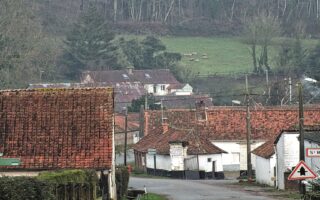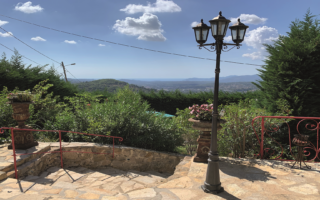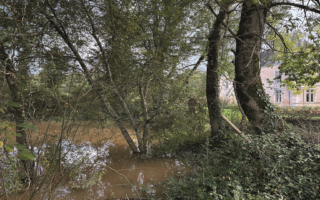Back to nature in Auvergne
A love of nature and the great outdoors brought Robert and Kathryn Harrison to Auvergne, where they hit upon a wild idea for holidays, says Stephanie Sheldrake
When Robert and Kathryn Harrison first saw the view from their house in the heart of the tranquil and unspoilt Livradois-Forez Regional Nature Park, they knew it was everything they had dreamed of.
Built on a slope, the country house is surrounded by 20 acres of woodland and wildflower meadows with spectacular views of the forest-covered mountains and valleys of Auvergne – an ancient landscape of extinct volcanoes where time seems to have stood still.
Originally from Manchester, the couple were keen to quit their busy city lives where they had been running a cleaning company and renovating properties in order to finance their new life in France, where they now live with their two young daughters, Daisy (four) and Olive (two).
In 2009, in the midst of the economic downturn, Robert and Kathryn were nonetheless determined to make a go of their dream business – a small luxury camping site where guests can stay in comfortable yurts and enjoy the beautiful landscape and wildlife that surrounds them.
“I wanted to teach people about camping, rather than create a place for people to just go camping,” explains Robert. A self-confessed ‘big Boy Scout’, Robert completed a nine-month ‘Bushcraft’ course in Sussex run by a colleague of Ray Mears, where he learnt a range of outdoor survival skills. Robert’s aim was to share his enthusiasm for nature and the great outdoors with guests who can learn about fire-making, animal tracking and making bows and arrows. During the training, Robert was introduced to some craftsmen who make yurts by hand. “It just fitted with what we wanted to achieve – the yurts give guests the opportunity to sleep under canvas but with all the comforts of a hotel room, making it accessible to all,” he says.
Robert and Kathryn started their search for their ideal property in Limousin, but it was the dramatic landscapes of Auvergne that captured their hearts. “You have to drive through miles of woods, lakes and forest to get to the house. When you arrive, there are the most amazing views of the mountains,” explains Robert. Situated just outside the small village of Laval-sur-Doulon in the heart of the Livradois-Forez Regional Nature Park, the seven-bedroom 1930s house was bigger than the other houses the couple had seen, and they could imagine themselves living there. The best part was that it came with 20 acres of meadow and woodland, as well as a barn and a small cottage. Though structurally sound, the house needed complete renovation when they bought it in December 2007. “The top floor had never been touched and in one of the rooms (now the bathroom) there were hooks in the beams and blood stains on the floor where they used to hang the pigs!” reveals Kathryn. Robert, his dad and his friend spent the next couple of years replacing windows and woodwork, plaster-boarding most of the rooms and knocking though walls to create the four-bedroom spacious family home it is now.
It was the beauty and tranquillity of the area that the couple really fell in love with. “We love how quiet it is – it feels really safe here. There’s not much traffic; you might see two cars a day and you hardly see anyone if you’re hiking or biking,” says Robert. Despite being surrounded by thousands of acres of forest, the house far from isolated: “We’re still in the centre of things – it’s only half an hour to the shops,” says Robert, “and there’s lots going on with local markets and festivals.”
Robert and Kathryn built up the business slowly by starting with just two yurts in summer 2009, then three yurts in 2010 increasing to four in 2011 and 2012. Robert admits that business was quiet when they first opened, but this soon changed when they were featured in an article about ‘glamping’ (glamorous camping) in The Guardian a year later. “The effect it had on business that year was amazing,” says Robert. “The hits on our website went from 40 per day to 140,” he adds. “After that we went in the Cool Camping book which was also great for us.”
Despite the language barrier and complicated paperwork, setting up the business was relatively easy due to the fact that official planning permission is not required for up to six tents on a plot of land, but approval must be obtained from the mayor. “Before we bought the house we had a meeting with the mayor,” says Robert. “Luckily he is very laid-back and saw the benefits of boosting tourism in the region.”
The couple have developed a good relationship with their mayor, and have successfully integrated into their local community by doing good turns for their neighbours. “It’s surprising how many people want to work together,” reveals Robert. “The mayor comes once a year to cut the grass in our meadow to make hay for a neighbour’s livestock for the winter.”
Robert admits that the language barrier has been one of the hardest challenges to overcome, but the couple are having lessons to improve. “Kathryn did A-level French so she’s good, but I didn’t really do much French at school,” he says. “Daisy goes to the local school and mixes with all the French children so she’s learning all the time – sometimes I ask her language questions!” he laughs.
Communication was by no means the biggest hurdle for the couple. When they moved permanently to Auvergne in 2011 (for the previous two seasons they just spent the summer there), their main concern was surviving the winter. “We’re 700 metres above sea level and our first winter here it went down to -26°C – even the old ladies in the village said it was an extreme winter!” says Robert. Fortunately the couple experienced a milder, albeit snowier, winter this year with temperatures getting down to a mere -9°C.
A world away from their city lives, the couple knew that living in this part of France would require a new mindset: “Being prepared is crucial. I’m constantly learning,” Robert admits. “We’re used to city life and having everything there for you. Here, we have to make sure we’ve got enough gas bottles in case we get snowed in, and enough wood to last the winter.”
There’s no doubt that the couple have needed to work hard to make this business a success. As well starting a family, having the house renovated and keeping the fast-growing hazel coppice cut back, the couple do not employ any staff to help with the yurts holiday business. During the holiday season they do all of the cleaning, cooking and bushcraft sessions themselves. “It’s very busy – working the summer is really hard but good fun at the same time,” says Robert. “We cook for guests three times a week and three times a week we do bushcraft, so the days don’t clash. Sometimes we cook for up to 25 people so it takes a lot of preparation.”
Despite the hard work, Robert and Kathryn love their new lives in Auvergne, in particular the social aspect of getting to know their guests. On the evenings that they cook, all the guests have dinner in the converted barn. Robert says: “Everyone really enjoys those nights. Because it’s a small site, everyone gets to know each other – they want to find out each other’s stories, and our story too.”
Robert’s bushcraft sessions have proven to be a big hit with families. “My mum and dad always said if you can keep the kids happy, the parents are happy,” he says. Robert teaches the children about fire-making and how to make a bow and arrow from the hazel coppice. “It grows straight so it’s perfect for making bows and arrows, and it grows back really quickly.” Next he takes them on a hunting trip: “We never see anything because they’re always too noisy,” laughs Robert, “but we collect wild blackberries and look for animal tracks”.
When it comes to tracking down animals, there are plenty to look for. The Regional Natural Park is home to many species of flora and fauna, from butterflies and grasshoppers to dormice and deer, as well as numerous species of bird. “We’ve got a wildlife camera strapped to a tree which takes pictures as things move. So far we’ve seen wild boar and piglets,” says Robert.
Minimising their impact on the environment was important to the couple. The yurts are made from sustainable ash coppice and they have installed luxury composting toilets. “Nothing is permanent – the yurts are on wooden platforms with oak posts in the ground so everything can be removed,” explains Robert. “We use eco products which are not only better for the environment; they are easier for drainage too.”
At night you really get a sense of how secluded the site is. “It’s really dark, unless the moon is out – you can’t see your hand in front of your face. Sometimes we go on night walks with the guests – it’s fun working out what the animal noises are. The kids love it!” says Robert. “The stars look amazing here. People love that, especially if they’re from the city and they’re not used to it.”
With business going well, what plans do Robert and Kathryn have for the future? “We’ve got a cottage on the site which we plan to renovate into self-catering accommodation in a couple of years’ time,” says Robert. They also have plans to build a freshwater swimming pool: “A posh pond basically!” laughs Robert. “But we don’t want to get too big – we’ll stick to the four yurts.”
There’s no doubt that the success of Robert and Kathryn’s business is due to their passion for the nature and beauty of this awe-inspiring part of France, and their ability to share this with their guests. The relaxing, back-to-nature way of life here has a remarkable effect on the guests, as Robert explains: “People change when they come. It’s funny, they just let themselves go and just relax.”
It’s not just Robert and his family who have fallen for this unspoilt part of France: “We’re sometimes surprised by how much our guests love it here. Some have said their kids change in the week they’re with us and that’s why they come back.” And with so much on offer here, it’s easy to see why. LF
www.yurtholidaysfrance.co.uk
Share to: Facebook Twitter LinkedIn Email


